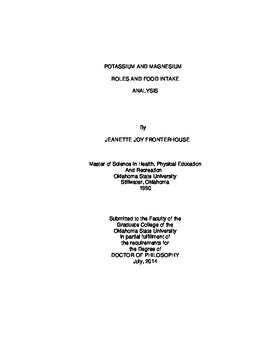| dc.contributor.advisor | Smith, Douglas Boyd | |
| dc.contributor.author | Fronterhouse, Jeanette Joy | |
| dc.date.accessioned | 2015-06-17T20:05:54Z | |
| dc.date.available | 2015-06-17T20:05:54Z | |
| dc.date.issued | 2014-07 | |
| dc.identifier.uri | https://hdl.handle.net/11244/14837 | |
| dc.description.abstract | A study of 31 male and female students at a college in Oklahoma was conducted to ascertain if Potassium and Magnesium requirements were being met. The consensus in the literature indicated an assumption that people are getting "plenty of Potassium" in their menus. Magnesium and BMI were also looked at to see if it was correlated with Potassium. | |
| dc.description.abstract | Design: Participants included a connivance sample of male and female volunteers from three nutrition classes at a community college in Oklahoma. Participants filled out a brief survey based on their computerized nutrition analysis (7 day average). Surveys included places for Magnesium, Potassium and BMI. | |
| dc.description.abstract | Results: Hypothesis 1 that potassium intake would be deficient contrary to assumptions in the literature was supported. 100% of male and female participants were deficient in Potassium. Adequate intake for Potassium is 4,700 mg a day. Average intake of participants was 1,121.90 mg. | |
| dc.description.abstract | Hypothesis 2 that Magnesium intake requirements were not being met was supported as well. 100% of male and female participants were deficient in Magnesium. Pearson's correlation for Potassium and Magnesium showed correlation was significant (P<0.01). BMI was not shown to be correlated. | |
| dc.description.abstract | Conclusion: Data is indicating a need for increased intake of Potassium rich foods such as fruits and vegetables. BMI was looked at to see if it was correlated with Potassium. Potassium may increase fatty acid metabolism however that could not be determined as BMI does not distinguish between adipose and muscle mass. Findings also showed a need for increased intake of Magnesium in this group. Due to the essential role of these nutrients such as improving mood, building muscle, protecting from hypertension and stroke, it may be prudent to emphasize the importance of increase intake of foods rich in Potassium and Magnesium. | |
| dc.format | application/pdf | |
| dc.language | en_US | |
| dc.rights | Copyright is held by the author who has granted the Oklahoma State University Library the non-exclusive right to share this material in its institutional repository. Contact Digital Library Services at lib-dls@okstate.edu or 405-744-9161 for the permission policy on the use, reproduction or distribution of this material. | |
| dc.title | Potassium and magnesium roles and food intake | |
| dc.contributor.committeeMember | Warren, Aric Jon | |
| dc.contributor.committeeMember | Passmore, Tim | |
| dc.contributor.committeeMember | Harris, Edward L. | |
| osu.filename | Fronterhouse_okstate_0664D_13618.pdf | |
| osu.accesstype | Open Access | |
| dc.type.genre | Dissertation | |
| dc.type.material | Text | |
| thesis.degree.discipline | Health, Physical Education and Leisure | |
| thesis.degree.grantor | Oklahoma State University | |
